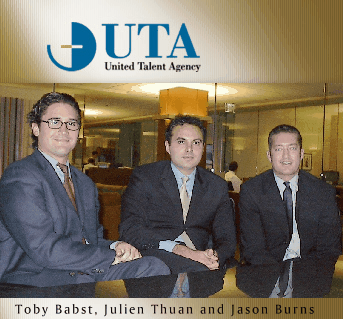MEET THE FOUR QUADRANTS
AGENT’S HOT SHEET
by Jim Cirile

Just what is a four-quadrant movie, and why should writers care about them? Simple—because they are often the most successful films, and therefore they are also the most coveted scripts.
ADVISORY BOARD
Richard Arlook
The Gersh Agency
Marty Bowen
United Talent Agency
Nicole Clemens
International Creative Management
Emile Gladstone
Broder, Webb, Chervin & Silbermann
Melinda Manos
Manos Management
Julien Thuan
United Talent Agency
Let’s start this shindig by plugging my favorite movie of last year. Okay, I loved Finding Neverland, but as a Bond fan and comic book fan and Brad Bird fan, heck, my top honors go to The Incredibles (Gee, what a shock—another terrific Pixar movie.) The success of this $92 million animated feature dovetails quite nicely into this month’s column—The Incredibles is a near-perfect four-quadrant movie.
Just what does “four-quadrant” mean? It’s a movie that appeals to all four main demographic groups—young and old, male and female. Obviously, many flicks do not do this. Strangely, my five-year-old daughter does not share my love of Army of Darkness. Yet she and her mother and I, along with all her female teenage cousins, all came out giddy from The Incredibles. As of this writing, the film has grossed $260 million, and that’s just the domestic box office.
So it stands to reason that studios are on the lookout for the next The Incredibles and its ilk—the 4-quadrant spec is the current “it” girl. UTA feature lit agent Julien Thuan says, “If you have a property that could be marketed to the four major demographics, presumably it will be a more successful movie. It’s obviously a large part of what ‘event films’ aspire to.”
And while “four-quadrant” may be a hip buzzword, there’s really nothing new about it. The Gersh Agency’s Richard Arlook tells us, “I’ve been getting calls for years from people looking for great family movies that work for young and old and male and female. And they’ll reference successful movies. Two years ago, it was Shrek. Now it’s The Incredibles or Meet the Fockers.” BWCS’ Emile Gladstone observes, “The top ten grossing movies of all time attracted a very broad audience. Now If you read the Titanic script, you wouldn’t necessarily think it was a four-quadrant movie, but it did hit on all quadrants.”
That’s one of the, er, incredible things about The Incredibles—like Titanic, on the surface, it too doesn’t appear to be a four-quadrant movie. An animated film about superheroes? And not even established characters? Kid’s flick, end of story. But the script smartly spun the old formula on its butt. Instead of having the female lead get kidnapped, with the male protagonist having to rescue her in Act 3, it’s the male protagonist who gets kidnapped, forcing the wife and kids to come to the rescue. This stroke of brilliance allowed the Elastigirl character to really come into her own and made millions of kids want to emulate the superheroics of Violet and Dash. “One hundred percent,” agrees Gladstone. “And thematically, it’s more about how to make the most of your mundane life. There’s certainly a lot about mid-life crisis in that movie, a lot of scenes that adults would relate to.” Thuan adds a few more reasons why The Incredibles performed so well versus some other superhero films that did not: “At the root of it, you had this emotional core that had universal appeal. It has a very simple idea—a family of superheroes that have to come together to save the world. It’s great comedy, but for the most part it’s clean comedy, so it can appeal to the entire family. And it has great messages. It’s not about violence. It’s not about a lot of the other crutches of those sorts of movies.” Gladstone agrees, “If movies were only about cool action sequences, then Elektra would have done well. It’s a combination of cool action sequences with characters that you really care about.”

So let’s say you, intrepid writer, deliver to your representative one of these elusive and coveted 4-quadrant specs. What happens now? “Frankly, when you have that kind of material, it becomes an obvious sell,” says Thuan, “and as a result, an obvious buy. So it’s easy for the marketing people to get behind it, because they essentially have a lot of ways in which to put the film out there and precedence for how they can do it.” Gladstone notes that the wider the appeal of the script, the greater the sell behind it. “Only certain studios will do a horror movie, and only certain studios will do a character-driven action movie. You figure out ‘Who is your hard target?’ in terms of your sales strategy—‘This is a Universal picture.’ ‘This is a Sony and a Universal picture, but it’s not a Warner Bros. picture.’ But with a four-quadrant movie, it’s everyone’s picture. The larger spec sales and bidding wars come from movies that appeal to a broader audience.” In other words, if you nail the 4-Q, that’s where the big paydays are.
Thuan and Arlook both break out the big guns when marketing a four-quadrant spec. “You definitely alert buyers in a different way to what you have,” says Thuan. “You identify producers who have experience making these kinds of films so that you can help to validate it as that kind of a film. It’s not always obvious to the buyers.” And when a terrific four-quadrant spec lands in Arlook’s lap, “I’ll call all the biggest producers in the world of 4-quadrant movies and hype ‘em on it,” he says, “and tell them ‘I’ve got one of those scripts that everybody’s looking for, and it’s a great script.’ But if it’s not a great script, I’m not calling anybody.”
And therein lies the rub—another reason the four-quadrant script is so coveted is because it’s deceptively difficult to pull off. “I’d rather have a small, brilliantly written Million Dollar Baby,” says Arlook, “or that kind of movie that’s going to attract a filmmaker, than the biggest idea in the world that’s written like crap.” UTA’s Marty Bowen seconds that. “Trying to write to appeal to everyone seems to be contradictory to the creative process. Within reason, a writer should write and not worry about mass marketing. Let the story he or she believes in find its own audience,” he says.
Still, all of our panelists advise their clients to maximize their script’s marketability... to a point. Gladstone feels that writers should be true to their voice while still watching box office trends. “If they’re romantic comedy writers, I’m asking them to make scripts more comedic and make sure there are set-pieces that allow for a marketing campaign,” he says. “I’m trying to steer romantic comedy writers from writing When Harry Met Sally to writing the best variation of Along Came Polly--not that that is the model for the script itself, but if you look at the marketing campaign and its success, you have to emulate that.”
Manager Melinda Manos mentions a recent debate based on marketability. “There’s a logo of a gang in (my client’s) script--the middle finger. It’s seen a lot. That’s something that would have definitely made the movie an ‘R.’ We said, ‘This may hurt the sale.’ So I had a conversation with the writer, the director attached, with the agent—‘What can we use instead of that?’ We came up with the second finger, then two fingers like a rapper’s move, and then the pinky... it got really stupid after awhile. We were like, ‘You know what? We’re leaving it. If we have someone that likes it enough, (but) they don’t want to buy it because of that, then we’ll change it.’” And therein lies the danger of self-censorship based on marketing concerns. Says Thuan, “For writers to already censor themselves in the creative process before anyone even sees the script, it’s just brutal. We end up with nothing. The voice is so diluted by the time it gets to the screen that to already start diluting based on anticipation of marketing or hitting key demographics--if that’s part of the writing process, it lacks purity to such a degree that most of the time, it won’t work.”
Moral? “This above all, to thine own self be true.” Some decent writer wrote that. If you crank out a 4-Q script shooting for that big payday, it probably won’t work. As always, write what you’re passionate about. But if you do decide to write a 4-Q, remember, “For the most part, the successful four-quadrant movies appeal to both kids and adults,” says Gladstone, “and have adult protagonists as well as kid protagonists. The adult protagonist, that’s where you’re going to find your star. That’s how you’re going to get your movie made.” Don’t write something like The Goonies where the kids are the sole protagonists. “Not gonna sell,” concludes Gladstone.




























